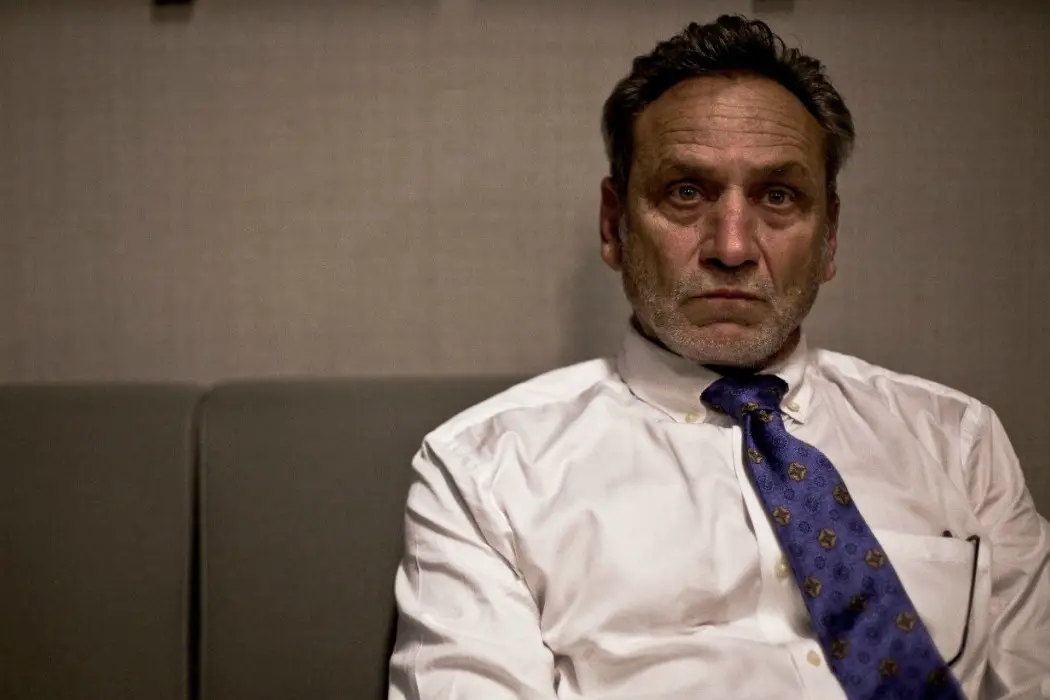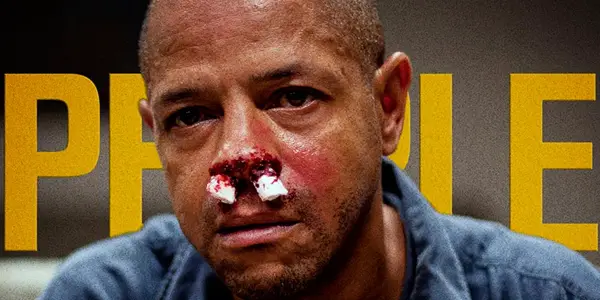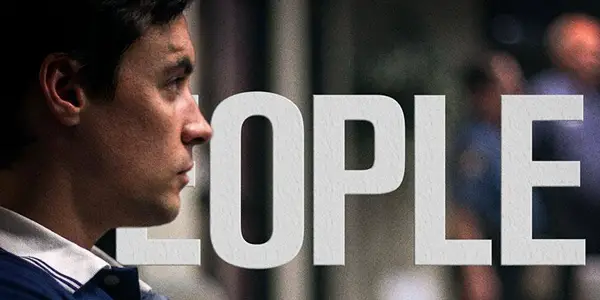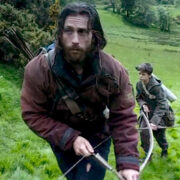PEOPLE: An Intense & Profound Character Dissection

Nathan decided to take a gap year after completing his…
People is an utterly fascinating watch. Sans splashy sets and production designs, big name actors or an extensive budget, People evades its hypothetical limitations by committing almost solely to the flawed characters that populate (and form the centre of) the piece. This indie release is so grounded in reality (for the majority of the time) and so deep-rooted in character development and theme work that the end result is a completely absorbing character dissection that, while conspicuously uneven, mostly succeeds in reaching the lofty heights director and writer Shane McGoey strives to achieve.
Structured as six vignettes (interwoven as part of a larger and richer tapestry), People delivers bite-sized but intense studies of individuals in society who share contradictory or conflicting opinions, with each chunk of the narrative delving far beyond the simple surface details in their relatively short run-times. Interlaced into each story is a profound sense of theme work, punctuated through a passionate exploration of these morally-skewed characters and those that surround and influence them. The stories that make up the piece are titled; Being For Others, The Lacked, Control, Values, Bad Faith and Nothingness.
As with most anthologies of this nature, some stories are naturally more interesting than others: when one story hits its stride (Being For Others and Bad Faith are standouts for very different reasons), it unknowingly undermines another chapter (the weakest being Control, sandwiched between superior chapters). It is simply part and parcel of the structure and while the low points are never poor enough to weaken the film’s overall infrastructure and cause a complete collapse, it inadvertently highlights something stronger that came before.
Admittedly, you do receive a stronger appreciation for the superior moments, but nonetheless it produces a rather uneven effort. At the brisk pace this film operates on though, it is never too long before something picks you back up and grips you again and the chapters you are interested in can alter from audience member to audience member, depending on taste and interest.
Shall we go into these stories individually? Okay then…
Opening with Being For Others (a two-hander set in a psychiatrist office that depicts a patient and her doctor attempting to unpack their counterpart), the seemingly one-take encounter is something akin to a tennis match. The back and forth between the pair of mostly detestable personalities is nothing short of hypnotizing, accentuated by a strong and sharp script that infuses imagery and parallels almost seamlessly into play.
Christine Lekas and Greg Homer play it effectively, forging an intriguing dynamic that keeps audiences on tenterhooks throughout – appreciatively, this seems to be the meatiest story and the pair make great use of the time, evoking a type of victim-prey dance that changes hand constantly. It’s evocative and provocative, standing out for all the right reasons.

The Lacked, an intended second date of a one-night stand that examines the aftermath of the steamy encounter, pulls some startling theme work into the frame, placing sexuality and identity as the main focus and refusing to shy away from personal perception in a smart and alluring way. It is here we begin to see some of the narratives’ flourish a little more clearly – but nuance keeps everything under control and audience’s guessing, encouraging them to form their own opinions as it progresses.
As mentioned, Control is my least favorite of the rather good bunch, as it seems to lose focus of what it’s trying to say early on. Set in a living room and acting as a verbal sparring between two ‘friends’, it incorporates a myriad of meaningful themes – migration, work ethic, attitudes – but appears too jumbled and messy to say anything eloquently enough. It cannot help but slide into unneeded melodrama at times, feeling repetitive and lacking the zing or sophistication of previous chapters. Admittedly, we see some wonderful parallels, with audio cues effectively signaling the stories progression; it’s not completely redundant but lacks a smart execution.
Values pulls up next an exchange that sees two partners hurrying to a hospital with an injury. The influence of this chapter cannot be entirely recognized in the moment but retrospect is a wonderful thing and the themes’ efficiency become more focused later on into the film. Script and language are a slight undoing here, as it appears unnecessarily dense on occasions and overwhelming – but McGoey’s direction ensures the atmosphere perpetuates throughout (and beyond) the brief scene by making great use of the almost confined setting. It bleeds into Bad Faith, a wonderfully choreographed and deeply impassioned piece, performed by Mustafa Harris, that sets the wheels in motion for the sixth and final climatic vignette.

In a somewhat surreal, all-but-the-kitchen-sink finale, the stories crash together in their own unique, and somewhat amusing, way. Loose ends are tied up (some more obvious than others) and everything builds up to a loud, whacky crescendo that drops back down to reality and abandons the piece on an appropriately ponderous note by the time it wraps up. It’s a mad conclusion that works in its own unconventional, off-key way.
An assured pair of hands
Keeping everything on track throughout is McGoey. As a director, he excels, evoking a sense of claustrophobia when appropriate, intimacy when needed and a thoughtfulness running through the veins of it all. His skill is evident in the method alone, with the technique in the way he weaves and peels back the narrative remarkable, ambitious and assured. Bad Faith in particular features some of the strongest direction seen in an indie film in quite some time, with background noise and audio cues excellently scoring the camera’s movements and framing methods, ultimately capturing a really tight direction that ought to stand loud and proud on his CV.
McGoey, as a writer, is decent enough but falls into the habit of being overly flowery with his dialogue; something that removes you from the reality the picture otherwise nails. Control and Bad Faith slip, overwhelming audiences with the sheer volume of language and the unbroken tirades of the individuals, sometimes eliciting the opposite effect to what it desires. It can be disengaging and demonstrates two of the only moments in which I became unhooked from the picture’s otherwise firm grasp and capability to draw you in. Essentially, it borders on pretentious rather than smart, alienating rather than engaging.
However, let’s not forget that this is a feature-length debut, meaning some leniency can be applied and you can generally appreciate the effort McGoey’s channelled into the concept and his intricacies in general. He manages to inject it with some quirkiness too, with the early warning, “the film is meant to be taken in small doses,” standing out (along with a plethora of other impressive details) even more on a second, equally enjoyable, watch.

Assembling a well-tuned cast is crucial for any film that wishes to thrive, particularly one of this minute scale. All eyes are fixed on the cast, especially one that examines the human condition so invasively and profoundly. In that regard, People largely flourishes – delivering some really terrific performances in here, with the majority tapping into their characters’ subconscious efficiently and subsequently delivering insightful turns that bring each individual to life.
A couple stumble, overcooking their roles and standing out for the wrong reason – but nothing is disastrous and in most cases, they have to apply broad strokes to characters to make up for the limited time we have within each story, meaning they can be excused. All manage to flesh their characters out resourcefully, bouncing off the script and the dynamics of each scene; they are not characters you can easily like or root for – but they are, ultimately, human and that makes for a fascinating watch.
In Conclusion
People is a determined, profoundly packed indie, with the intricacies of the human condition and relationships manifesting into a well-realized piece that avoids the pitfalls of its limited scale. By focusing on the characters and the deft, striking and morally-ambiguous themes that populate the film, we capture a snapshot into the lives of the people living next door, the person opposite you on the bus or the employee serving you a coffee.
What it lacks in scale it makes up for in scope, with director and writer Shane McGoey finding a great premise and executing it efficiently, providing a fresh and unconventional end product that suggests a fruitful career for the talent involved.
What is your favorite vignette of the film? And what is your favorite anthology-based film? Let me know in the comments!
Shane McGoey’s People is available to stream and buy on Amazon Prime now.
Does content like this matter to you?
Become a Member and support film journalism. Unlock access to all of Film Inquiry`s great articles. Join a community of like-minded readers who are passionate about cinema - get access to our private members Network, give back to independent filmmakers, and more.
Nathan decided to take a gap year after completing his A-Levels (Media Studies, English Language & Literature and Drama & Theatre Studies) to gain some journalism and media experience before making the next step. In that time, he has continued to run his blog - PerksOfBeingNath - which is now approaching its second anniversary and crammed in as many cinema visits as humanly possible. Like a parent choosing their favourite child, he refuses to pick a favourite film but admits that it is currently a tight race between Gone Girl and La La Land. Self-admitted novice on cinema of the past and always open to suggestions. http://perksofbeingnath.blogspot.co.uk












